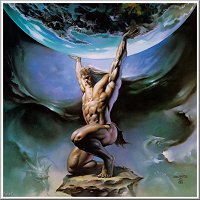
APHRODITE
CLICK TO ENLARGE

ATLAS
by Boris Vallejo
CLICK TO ENLARGE
|
MEDICAL ALLUSIONS PAGE ONE
 Aphrodite was the goddess of love and beauty, who
sprang from the foam of the sea at Cyprus. She was married to
the lame and homely god Hephaestus, but that didn't prevent the
goddess of love from having numerous illicit affairs. She gave
her name to:
Aphrodite was the goddess of love and beauty, who
sprang from the foam of the sea at Cyprus. She was married to
the lame and homely god Hephaestus, but that didn't prevent the
goddess of love from having numerous illicit affairs. She gave
her name to:
 Aphrodisiacs
Aphrodisiacs
And as Venus, her Latin name:
 Venereal
diseases Venereal
diseases
 Arachne was a mortal maiden highly gifted in
the art of weaving, which was the Olympian goddess Athena's
domain. Arachne got so full of herself she vainly compared
herself to Athena, and challenged her to a weaving contest. When
she lost, Athena transformed her into the first spider. From
Arachne we get:
Arachne was a mortal maiden highly gifted in
the art of weaving, which was the Olympian goddess Athena's
domain. Arachne got so full of herself she vainly compared
herself to Athena, and challenged her to a weaving contest. When
she lost, Athena transformed her into the first spider. From
Arachne we get:
 Arachnophobia - "arachne" (spider) and "phobos"
(fear)
Arachnophobia - "arachne" (spider) and "phobos"
(fear)
 "Arachno-"
is also part of the term "arachnodactyly" which refers
to long spider-like fingers and toes, a frequent finding in Marfan
syndrome, a heritable disorder of connective tissue. "Arachno-"
is also part of the term "arachnodactyly" which refers
to long spider-like fingers and toes, a frequent finding in Marfan
syndrome, a heritable disorder of connective tissue.
 Aeolus was the god of winds in Greek mythology.
In Homer's epic poem 'The Odyssey, the hero Odysseus visits the
land of Aeolia, where Aeolus gives him an "askos",
a Greek word that means bag. This bag contains the west winds,
which help Odysseus in his voyage.
Aeolus was the god of winds in Greek mythology.
In Homer's epic poem 'The Odyssey, the hero Odysseus visits the
land of Aeolia, where Aeolus gives him an "askos",
a Greek word that means bag. This bag contains the west winds,
which help Odysseus in his voyage.
 The origin
of the clinical sign ascites is from the Greek
noun 'askos', which means bag. The ancient Greeks knew of the
condition we now know to be ascites, calling it ascitēs
(the baggy disease), according to the 'baggy' feature
of the abdomen formed from increased fluid in the peritoneum. The origin
of the clinical sign ascites is from the Greek
noun 'askos', which means bag. The ancient Greeks knew of the
condition we now know to be ascites, calling it ascitēs
(the baggy disease), according to the 'baggy' feature
of the abdomen formed from increased fluid in the peritoneum.
 Atlas was a mighty Titan who fought against
Zeus and the Olympians when young Zeus was trying to consolidate
his rule over the universe. After their defeat, the Titans were
punished in various ways. Atlas was sentenced to bear the weight
of the heavens and the celestial globe upon his back for
eternity. In medicine we have:
Atlas was a mighty Titan who fought against
Zeus and the Olympians when young Zeus was trying to consolidate
his rule over the universe. After their defeat, the Titans were
punished in various ways. Atlas was sentenced to bear the weight
of the heavens and the celestial globe upon his back for
eternity. In medicine we have:
 Atlas, the
name of the first vertebrae, but also the name of the Titan
who was condemned to bear the weight of the heavens, separating
it from the earth, a comparison to the function of the
Atlas vertebrae, which has to bear the weight of the
skull. Atlas, the
name of the first vertebrae, but also the name of the Titan
who was condemned to bear the weight of the heavens, separating
it from the earth, a comparison to the function of the
Atlas vertebrae, which has to bear the weight of the
skull.
 Echo was a very attractive young nymph who
never stopped talking. One day she deceived the goddess Hera,
who then passed a sentence upon her not to be able to speak but
only to reply by repeating the last words of the person talking
to her. When Echo fell in love with Narcissus she was unable to
express her feelings and she could only repeat his last words –
he rejected her love and she pined away in grief. Echo gave her
name to:
Echo was a very attractive young nymph who
never stopped talking. One day she deceived the goddess Hera,
who then passed a sentence upon her not to be able to speak but
only to reply by repeating the last words of the person talking
to her. When Echo fell in love with Narcissus she was unable to
express her feelings and she could only repeat his last words –
he rejected her love and she pined away in grief. Echo gave her
name to:
 echolalia (almost
automatic repetition of words or phrases heard) echolalia (almost
automatic repetition of words or phrases heard)
 echopraxia (involuntary
mimicking of another's movements) echopraxia (involuntary
mimicking of another's movements)
 In
one of the greatest tragedies in Greek mythology,
Electra persuaded her brother Orestes to murder their
mother and her lover called Aegisthus, who were responsible for
the killing of their father Agamemnon, whom she loved. In
one of the greatest tragedies in Greek mythology,
Electra persuaded her brother Orestes to murder their
mother and her lover called Aegisthus, who were responsible for
the killing of their father Agamemnon, whom she loved.
 The Electra Complex refers to the erotic attachment of a
daughter to her father.
The Electra Complex refers to the erotic attachment of a
daughter to her father.
Medical Allusions continues on
page two!

|







